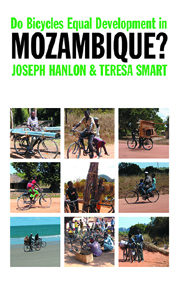Book contents
- Frontmatter
- Contents
- Acknowledgements
- The authors
- Money & measurements
- Abbreviations, acronyms & glossary
- Part I IS THERE DEVELOPMENT IN MOZAMBIQUE?
- 1 Introduction: more bicycles, but …
- 2 A brief history: war, peace & slow recovery
- 3 Can peasants pull Nampula out of poverty?
- 4 The Manica miracle is over
- 5 Cashew: from disaster to export model
- 6 Tobacco: hard choices
- 7 Has poverty decreased?
- 8 Is there development in Mozambique?
- Part II ACTORS & CONTEXT
- Part III ALTERNATIVES & THE DEVELOPMENTAL STATE
- Appendix 1 Aid
- Appendix 2 Investment & other tables
- Bibliography
- Index
3 - Can peasants pull Nampula out of poverty?
from Part I - IS THERE DEVELOPMENT IN MOZAMBIQUE?
Published online by Cambridge University Press: 05 April 2013
- Frontmatter
- Contents
- Acknowledgements
- The authors
- Money & measurements
- Abbreviations, acronyms & glossary
- Part I IS THERE DEVELOPMENT IN MOZAMBIQUE?
- 1 Introduction: more bicycles, but …
- 2 A brief history: war, peace & slow recovery
- 3 Can peasants pull Nampula out of poverty?
- 4 The Manica miracle is over
- 5 Cashew: from disaster to export model
- 6 Tobacco: hard choices
- 7 Has poverty decreased?
- 8 Is there development in Mozambique?
- Part II ACTORS & CONTEXT
- Part III ALTERNATIVES & THE DEVELOPMENTAL STATE
- Appendix 1 Aid
- Appendix 2 Investment & other tables
- Bibliography
- Index
Summary
We were told we could get sunflower seeds if we formed an association, so in 1999 we did. And a trader came from Pemba and bought our sunflower. But he paid such a low price that we realised this could not be our ‘struggle against absolute poverty’. So in 2002, we decided to try paprika, because an INGO, Care, gave us seeds, fertiliser and extension support, and said they had a buyer funded by Dutch aid. But no one ever came to buy our paprika. So we had a meeting and decided to try onions. Now all 33 of us produce onions – some people take them to the local market to sell and a few traders come here. But that is limited. We hope to produce 40 tons of onion this year, but can we sell them? We have no transport to take onions to bigger markets like Nampula; no one will help us with transport. (Jaime Agostinho, treasurer of Associação de Ehiquite-Iapala in the west of Nampula province.)
We were in Iapala as part of extended visits to two provinces, Nampula and Manica, where everyone said there were more bicycles, and so it was believed that development was taking place. We also chose these places because they seemed very different. Nampula is a province with small producers and associations, while Manica was reportedly embarking on a boom driven by medium-sized commercial farmers. This chapter and the next report on our investigations.
- Type
- Chapter
- Information
- Do Bicycles Equal Development in Mozambique? , pp. 16 - 26Publisher: Boydell & BrewerPrint publication year: 2008



